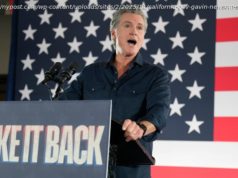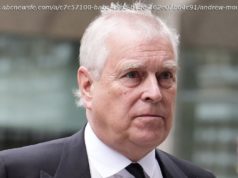North Korea warns that „the U. S. mainland is on the crossroads of life and death.“
U. S.-North Korea tensions topped the agenda at Sunday’s meeting of foreign ministers in Manila, but Secretary of State Rex Tillerson and his North Korean counterpart avoided any direct contact.
The Association of Southeast Asian Nations (ASEAN) gathering came a day after the United Nations imposed tough new sanctions on Pyongyang for its nuclear and missile programs and less than a week after Tillerson vowed that the U. S. has no intention of overthrowing the dictatorship of Kim Jong Un.
That diplomatic concession led to speculation that Tillerson and Ri Yong Ho of North Korea, attending their first meeting together, might actually meet. But they appeared to take pains to avoid a casual meeting. Tillerson even skipped an evening gala attended by Ri, saying he was preparing for Day 2 of the summit.
Tillerson did meet with top diplomats from South Korea and China on Sunday and seemed to get a long-awaited boost from Beijing in exerting pressure on North Korea, as Chinese Foreign Minister Wang Yi publicly admonished North Korea to abide by the new sanctions.
“Do not violate the U. N.’s decision or provoke international society’s goodwill by conducting missile launching or nuclear tests, ” Wang said he told North Korea’s Ri.
Ri did not respond publicly. North Korea’s Rodong Sinmun news website published a scathing commentary dismissing the sanctions as „cooked up by the U. S., “ adding that „the U. S. mainland is on the crossroads of life and death.“
More: North Korea missile launch gives already nervous fliers more to worry about
More: U. N. Security Council imposes strong sanctions on North Korean exports worth over $1B
More: Kim Jong Un is cruel and dangerous but not crazy, North Korean experts say
North Korea has launched more than a dozen test missiles this year. Concerns were heightened late last month when tests of an intercontinental ballistic missile indicated Pyongyang may be within a year or two of obtaining the technology to reach the U. S. with nuclear missiles.
The U. S.-sponsored sanctions approved unanimously Saturday by the U. N. Security Council target already-meager North Korean exports such as coal, iron, lead and seafood, as well as revenue streams such as foreign joint ventures. Countries also are banned from increasing the number of visiting workers from North Korea. Tens of thousands of them return hard currency to the increasingly isolated regime.
“It was a good outcome, ” Tillerson said Sunday about the sanctions. Nikki Haley, the U. S. ambassador to the United Nations, called the sanctions the most stringent on any country „in a generation.“
President Trump was thrilled, tweeting: „The United Nations Security Council just voted 15-0 to sanction North Korea. China and Russia voted with us. Very big financial impact!“
China and Russia went along, but urged the U. S. and South Korea to scale back joint military exercises and a missile defense program that have raised the ire of North Korea. Wang also pressed for a restart of six-party talks involving North and South Korea, the U. S., China, Russia and Japan.
The U. S. has rejected both proposals, although Tillerson said last week the U. S. was willing to talk with Pyongyang — if the North agrees to abandon its quest for nuclear weapons.
At the ASEAN meeting, Tillerson also met with Russian Foreign Minister Sergey Lavrov on the sidelines, their first encounter since new U. S. sanctions on Russia were approved overwhelmingly by Congress and signed into law grudgingly by Trump.
Lavrov told reporters that he and Tillerson agreed to preserve a diplomatic channel that Russia had earlier suspended as a reaction to the sanctions, the Associated Press reported.
„We felt that our American counterparts need to keep the dialogue open, “ Lavrov said.
China, however, is easily North Korea’s biggest trading partner and economic benefactor, and helped design the sanctions package. China’s position appeared to reflect positive movement following an unrelenting effort by Trump to enlist Beijing’s aid in curbing Pyongyang’s military buildup.
Jay Lefkowitz, a former U. S. special envoy on human rights in North Korea, said China’s efforts were encouraging but he questioned the value.
„I’ m not convinced China has made the judgment that the regime in North Korea is more harmful to Chinese interests than reforming or eliminating the regime, “ Lefkowitz told USA TODAY. „At the end of the day, it will take more than sanctions.“
Susan Thornton, acting assistant secretary of state for the region, said the U. S. would closely monitor Beijing for compliance with the sanctions. China, she said, has typically cooperated with sanctions after flagrant violations only to loosen the reins over time.
Harry Kazianis, director of defense studies at the Center for the National Interest, was unimpressed by China’s tough talk.
„We have no reason to believe China will enforce these new sanctions, “ Kazianis told USA TODAY. „They never have and likely never will. The simple fact is Beijing is likely more afraid of North Korea than we are.“
Kazianis said China fears that too much pressure could collapse Kim’s regime, sending millions of refugees into China and igniting a civil war where nuclear and chemical weapons could lead to catastrophe.
„China’s strategy is to ensure the status-quo hold for at least the short- to medium- term, “ he said.
On Monday, Tillerson is scheduled to meet with Philippine President Rodrigo Duterte and will likely raise the issue of human rights in the country where a brutal crackdown on drugs has left more than 7,000 dead, Thornton said last week.
Also on the agenda for the ASEAN meeting was an attempt to address the rising assertiveness of China in the region as Beijing continues to construct military facilities on man-made islands in the disputed waters of the South China Sea.
Start
United States
USA — Political U. S.-North Korea tensions mount over tough new sanctions at Manila meeting






